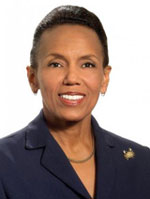|

|
 |
|
Last Updated: Feb 13, 2017 - 1:45:37 AM |
 Nassau, Bahamas - Remarks by Sen. the Hon. Z.C. Allyson Maynard Gibson, QC Attorney
General and Minister of Legal Affairs at The ICT for Persons with
Disabilities Workshop Melia Nassau Beach Hotel on 8th December, 2016: Nassau, Bahamas - Remarks by Sen. the Hon. Z.C. Allyson Maynard Gibson, QC Attorney
General and Minister of Legal Affairs at The ICT for Persons with
Disabilities Workshop Melia Nassau Beach Hotel on 8th December, 2016:
Mr. Trevor Prevatt, Consultant and representative of the Caribbean Telecommunications Union
Mr. Randolph Dorsette, Chairman of URCA
Representatives of the Special Education Section of the Ministry of Education
Commissioners and Representatives of the National Commission for Persons with Disabilities - Mrs. Sheila Culmer
Students teachers and staff of the Erin Gilmour School for the Blind and the Centre for The Deaf
It is with great pleasure that I welcome you to this workshop of Information and Communication Technology for Persons with Disabilities, organized by the Government of The Bahamas and the Utilities Regulation and Competition Authority (URCA) in collaboration with the Caribbean Telecommunications Union (CTU).
During the octave of National Disabilities Day it is fitting that we examine and inform ourselves on ways to use technology to improve opportunities for the social and economic inclusion of persons with disabilities.
This workshop is an example of CARICOM’s collaboration, through the CTU, with governments to improve quality of life of our people using Information and Communications Technology (ICT).
Earlier this year, Mr. Houlin Zhao, Secretary General of the ITU, announced, here in Nassau, that the ITU had identified New Providence for the prestigious designation of Smart Island, the first in the Western Hemisphere. The Government considered that we must not only be SMART here in New Providence but across all of islands of The Bahamas. To that end, the Government is working with the ITU to develop policies and projects which will infuse ICT into every aspect of life in The Bahamas, driving social and economic development for all.
Since 2009 and the UN Convention for the Right of Persons with Disabilities new trends in science and technology innovation have enabled ICT applications to better meet the needs of people living with disabilities. Information and Communication Technologies (ICTS) such as mobile phones, satellites or the internet expand access to education and other key public services, promoting digital inclusion.
It was Major Mason of the Salvation Army who in 2001 asked me to commit to making every effort to include persons with sight impairment as team members in any Ministry that I was asked to lead. He pointed out that if Government deliberately determined to employ persons with disabilities there would be significant socio economic impact.
In every Ministry that I have been a part of, and in the private sector, I have had the support of the Erin Gilmour School for the Blind in engaging persons as team members.
Our team at the Office of the Attorney General and Ministry of Legal Affairs uses the JAWS software. And the team at the Registrar General’s Department uses technology that enables sight impaired people to see clearly computer screens. And we find that hearing impairment is not a hindrance to productivity at OAG. ICTs are making a positive impact on our ease of doing business efforts and sight and hearing impaired persons are helping us in these efforts.
I’m very happy to announce that we are working to take these efforts to another level. The US State Courts, the IDB and the Erin Gilmour School for the Blind are working with us to use ICTs to train sight impaired persons as digital transcriptionists. We have asked that the digital transcription solution for our courts include the capacity for sight impaired persons to be transcriptionists.
We envisage the day when, using ICTs, there will be a division of the Salvation Army that transcribes documents for our Courts or anyone else requiring transcription.
The ability of our Courts to promptly to provide transcripts will improve efficiency in the administration of justice and our ease of doing business rating.
Government has embraced the transformative power of ICTs. ICTs have transformed our lives. In The Bahamas, the first SMART Island in this hemisphere, persons with disabilities are participating in this transformation.
The Government’s vision is for the creation of a society in which being digitally connected is a way of life, where creativity is stimulated and various advances in ICTs is encouraged, nurtured and developed so that the gifts, talents and capabilities of each individual are fully developed. It is important, therefore, that people benefit on an equal basis from the development of technology to ensure that they access an information society that is inclusive and free from barriers.
This workshop is an opportunity and avenue to capacity building – to ensuring that persons with disability realize their full potential.
I am delighted to be a part of this important initiative, and look forward to continuing the work to ensure that full integration and use of ICTs, including by persons with disabilities, builds a strong foundation for the SMART Bahamas that we are building for the future.

© Copyright 2016 by thebahamasweekly.com
Top of Page
|
|
 |

|
